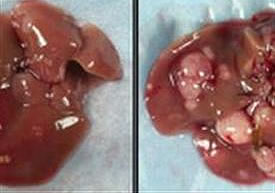By
Liz Highleyman
 |
|
Left:
liver cancer without androgen receptor; Right:
liver cancer with androgen receptor (Source:
University of Rochester)
|
|
Over
years or decades, chronic HBV
infection can lead to serious liver disease including
cirrhosis and hepatocellular
carcinoma (HCC), a form of primary liver cancer. Many
factors, including sex, influence the risk of developing HCC,
but the underlying biological mechanisms are not fully understood.
Men account for about 75% of all liver cancer cases.
Androgens are considered male hormones -- although women also
produce them in smaller amounts -- and they are responsible
for male secondary sex characteristics; androgen receptors,
which must interact with androgens in order for them to exert
their effects, are more active in men. Prior research has
shown that liver damage due to hepatitis B is associated with
androgen levels in the blood, but the reason for this link
is unclear.
Ming-Heng Wu and colleagues from Taiwan and the U.S. performed
a study of mice to learn more about the association between
androgens and liver cancer. They used transgenic or genetically
altered HBV-L-AR(-/y) mice with hepatitis B that lacked androgen
receptors only in hepatocytes, or working liver cells (blocking
androgen receptors throughout the body would have the effect
of chemical castration).
Results
 |
Hepatic
androgen receptors promoted HBV-induced development of
HCC. |
 |
After
6 months, more than 90% of mice with normal androgen receptors
developed HCC, compared with just 27% of those with missing
androgen receptors. |
 |
HBV-L-AR(-/y)
mice without androgen receptors that received a low dose
of the carcinogen N'-N'-diethylnitrosamine had a lower
likelihood of developing HCC than wild-type (non-mutated)
littermates. |
 |
Altered
mice that did develop cancer had smaller tumor sizes,
fewer foci formations, and lower alpha-fetoprotein levels
than wild-type mice. |
 |
The
androgen receptor bound to the androgen response element
in HBV DNA, near the virus core promoter, thereby enhancing
transcription of HBV genetic material and leading to increased
viral load. |
 |
This
triggered a positive feedback mechanism leading to expression
of the gene that produces the HBx protein and others known
to have an oncogenic or cancer-causing effect. |
 |
Administration
of a chemical (ASC-J9) that selectively degrades androgen
receptors reduced HCC tumor size. |
These
results, the study authors concluded, "demonstrate that
targeting the androgen receptor, rather than the androgen,
could be developed as a new therapy to battle HBV-induced
HCC."
"Our study is the first in vivo evidence to demonstrate
a direct connection between HBV-induced liver cancer and the
androgen receptor," co-author Chawnshang Chang said in
a press release issued by the University of Rochester. "This
is important because so far most work has focused on eliminating
total serum androgen levels, a type of therapy that has shown
little success."
Chang
previously found that the androgen receptor is likewise associated
with development of prostate cancer and bladder cancer (which
also occurs much more often in men than women). He also developed
ASC-J9, a synthetic compound based on compounds found in curcumin.
Institute
of Basic Medical Sciences, National Cheng Kung University,
Tainan, Taiwan; George Whipple Lab for Cancer Research, Departments
of Pathology and Urology and Wilmot Cancer Center, University
of Rochester Medical Center, Rochester, NY; Sex Hormone Research
Center, Graduate Institute of Clinical Medical Science, Department
of Obstetrics and Gynecology, China Medical University/Hospital,
Taichung, Taiwan; Division of Hematology-Oncology, Department
of Internal Medicine, Chang Gung University/Memorial Hospital,
Taoyuan, Taiwan; Department of Molecular Microbiology and
Immunology, University of Southern California, Los Angeles,
CA.
6/8/10
Reference
MH Wu, WL Ma, CL Hsu, and others. Androgen receptor promotes
hepatitis B virus-induced hepatocarcinogenesis through modulation
of hepatitis B virus RNA transcription. Science Translational
Medicine 2(32): 32ra35 (Abstract).
May 19, 2010
Other source
University
of Rochester. Androgen Receptor May Explain Male Dominance
in Liver Cancer. Press release. May 19, 2010.
